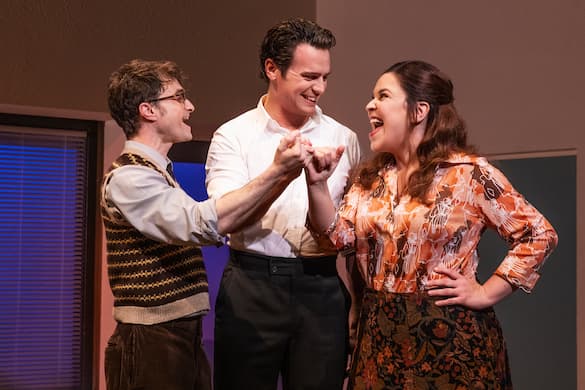Maria Friedman Finally Conquers a Sondheim-Furth Collaboration That Has Long Proved Difficult
The original Broadway production of ‘Merrily We Roll Along’ in 1981 was neither a critical hit nor a commercial one; expect bigger things from this version, with Jonathan Groff, Daniel Radcliffe, and Lindsay Mendez starring.

When Stephen Sondheim and librettist George Furth sat down to collaborate on “Merrily We Roll Along” more than 40 years ago, their premise was presumably that only one thing is more poignant than a story of youthful hope fading into middle-aged cynicism — and that’s the same tale told in reverse.
Based on the Kaufman and Hart play of the same title, the musical follows three friends — a composer, Franklin; a playwright and his collaborating lyricist, Charley; and a novelist and critic, Mary — backward in time over roughly 20 years. The original Broadway production in 1981 was neither a critical hit nor a commercial one, managing a scant 16 post-preview performances, and while the score produced several enduring standards, the piece has been stumping directors ever since.
That was, at least, until Maria Friedman got her hands on it. A veteran interpreter of Sondheim as a performer, Ms. Friedman starred in a 1992 production of “Merrily” for which Furth and Sondheim made revisions. Eleven years later, she brought those changes to her own London staging; she then transferred them, with a few additional tweaks, to an off-Broadway production last year — along with a spanking-new cast, led by Jonathan Groff, Daniel Radcliffe, and Lindsay Mendez as, respectively, Frank, Charley, and Mary.
Those young stage and screen veterans, accompanied by a sterling ensemble, now bring the musical back to Broadway for the first time since its premiere. And you can bet it’s going to stick around a lot longer this time — past its scheduled closing date of March 24, I’d wager, provided its luminous stars can fit the extra time into their schedules.
If anything, this “Merrily” moved me even more than it had downtown, from the moment the orchestra, conducted by music director Joel Fram, kicked into the overture, serving Jonathan Tunick’s swinging, thrilling orchestrations with a joyful panache that would fill the house throughout the show.
The larger size of the new venue also seems to have benefited Tim Jackson’s choreography, which I found a bit overzealous off-Broadway. The musical transitions that Sondheim provided between scenes, to represent passing years, feel at once more relaxed and more purposeful here, so one can better focus not only on the lyrics but the consistently beautiful singing of all the cast members.
Several performers play other substantial roles in the drama — notable among them is an imposing Krystal Joy Brown, cast as Frank’s second wife, Gussie, a vat of cold, desperate ambition whom we first meet at a party celebrating her husband’s transition to Hollywood producer. By this point, which technically is the first scene but chronologically is the final one, Charley and Frank are no longer talking; Mary, who has carried a torch for Frank since their first meeting, is an embittered alcoholic, and Frank is already zeroing in on another woman.
Katie Rose Clarke turns in a touching performance as Frank’s ingenuous first wife, Beth, and Reg Rogers is alternately droll and wrenching as Joe, the Broadway producer who bankrolls Gussie’s transformation to stage star from secretary — though she argues, not without merit, that she “made herself up” — before losing her to Frank.
Those who are drawn to this production by Messrs. Radcliffe and Groff — and Ms. Mendez, perhaps less widely known outside theater circles, but a Tony Award winner and a singer and actress of extraordinary versatility — will not be disappointed. Under Ms. Friedman’s guidance, the three have not only mined the virtues and flaws that make their characters memorable; they’ve developed a seemingly effortless chemistry that’s as delightful in playful moments as it can be heartrending at other points.
With Frank’s pyrrhic success anchoring the plot, the role proves a fine showcase for both Mr. Groff’s leading-man charisma and his capacity for emotional nuance. As the more transparent — and volatile — Charley and Mary, Mr. Radcliffe and Ms. Mendez prove superb foils, each expertly managing the biting wit and shattered yearning that inform their parts.
The musical itself remains less than perfect; following the hilarity and trauma that fills the first act, the second takes a while to get off the ground. Once it does, though, it begins burrowing its way into your heart — entering with full force in the final scene, which unfolds on the rooftop of an old tenement building in 1957, on the evening that the Soviets launched Sputnik 1 into orbit.
“Do you guys realize that now we are going to be able to do anything?” a very young, idealistic Frank asks Mary and Charley. Spoken after all that has unfolded onstage, the line is almost too painful to bear; yet in the gifted, loving hands of Ms. Friedman and her company, this “Merrily” never loses its transcendent sense of wonder.

